
Teknokultura: Revista de Cultura Digital y Movimientos Sociales
Scope & Guideline
Unveiling the Dynamics of Digital Movements
Introduction
Aims and Scopes
- Digital Culture and Society:
The journal explores how digital technologies shape cultural practices and societal norms, particularly in relation to identity, activism, and community engagement. - Social Movements and Activism:
It investigates the role of digital platforms in facilitating social movements, examining themes like feminist activism, anti-racism, and political resistance. - Critical Media Studies:
The journal emphasizes critical analyses of media discourse and representation, particularly concerning marginalized voices and issues of power dynamics. - Gender and Sexuality Studies:
A significant focus is placed on gender and sexuality, exploring topics such as toxic masculinity, feminism, and LGBTQ+ identities in digital spaces. - Geopolitical Contexts:
It addresses communication and cultural phenomena in specific geopolitical contexts, particularly from a Latin American perspective, highlighting issues of imperialism and coloniality. - Methodological Innovations:
The journal promotes innovative methodologies for studying digital phenomena and social interactions, including qualitative approaches and new media analyses.
Trending and Emerging
- Digital Activism and Feminism:
There is a rising focus on how digital platforms foster feminist movements and activism, particularly in the context of the #MeToo movement and other contemporary social justice initiatives. - Rage and Emotion in Digital Discourse:
The examination of emotions such as anger and rage in digital contexts is becoming a significant theme, reflecting a societal shift in how emotions are expressed and politicized online. - Algorithmic Governance and Surveillance:
Emerging discussions around the implications of algorithms in shaping public discourse, governance, and personal identity highlight concerns about surveillance capitalism. - Intersectionality in Social Movements:
A growing emphasis on intersectional approaches to social movements, particularly how race, gender, and class intersect in the digital age, is becoming more prominent. - Cultural Representation and Identity:
The journal is increasingly addressing how digital media influences cultural representation and identity formation, particularly among marginalized communities.
Declining or Waning
- Traditional Media Critique:
The focus on traditional media's role in society has waned as attention shifts towards digital platforms and their impact on contemporary communication. - Narrowly Defined Technological Studies:
Studies that solely focus on technological aspects without considering social implications are becoming less frequent, as there's a growing emphasis on interdisciplinary approaches. - Static Views on Gender:
The exploration of gender roles has transitioned from static analyses to more dynamic and intersectional perspectives, leading to a decreased focus on traditional gender studies. - Generalized Digital Literacy:
Broad discussions on digital literacy have diminished in favor of more nuanced explorations of specific demographics and their unique challenges in the digital realm. - Conventional Educational Technology:
Interest in conventional educational technology approaches has declined, as the journal now favors studies that critique or innovate within the context of digital education.
Similar Journals
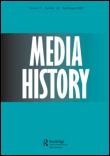
Media History
Decoding the Impact of History on Modern MediaMedia History, published by Routledge Journals, Taylor & Francis Ltd, stands at the forefront of scholarship in the intersection of media, culture, and historical study. With a robust ISSN of 1368-8804 and E-ISSN of 1469-9729, this esteemed journal plays a vital role in advancing research across multiple disciplines, ranking notably in the top quartiles of Communication, Cultural Studies, and History categories as of 2023. Based in the United Kingdom, the journal aims to bridge the gaps between the past and present media narratives, providing researchers, professionals, and students with cutting-edge insights and critical analyses. While Media History does not currently offer open access options, its authoritative content remains crucial for those seeking to deepen their understanding of media evolution and its impact on contemporary society. As a highly respected publication, it serves as an essential resource for anyone interested in exploring how historical contexts shape media practices and perceptions.

Journal of Religion and Popular Culture
Advancing Scholarship on Culture's Influence on BeliefJournal of Religion and Popular Culture is a unique academic platform dedicated to the exploration and analysis of the intricate relationships between religious practices and popular culture. Published by University of Toronto Press, Inc., this journal provides a critical forum for scholarly discourse, appealing to researchers, students, and professionals in the fields of Cultural Studies and Religious Studies. Since its inception in 2013, the journal has established itself as a significant contributor to the academic community, evidenced by its current category quartiles: Q4 in Cultural Studies and Q3 in Religious Studies as of 2023, alongside its Scopus rankings. Although it operates on a subscription basis, the journal's accessibility enhances its reach within the scholarly community. With a focus on fostering interdisciplinary dialogue, the Journal of Religion and Popular Culture invites contributions that illuminate the dynamic interplay between faith and the vibrant expressions of popular culture, making it a vital resource for understanding contemporary societal trends.
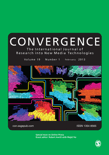
Convergence-The International Journal of Research into New Media Technologies
Transforming Understanding of Evolving Media LandscapesConvergence - The International Journal of Research into New Media Technologies, published by SAGE Publications Inc., stands at the forefront of scholarly discourse in the dynamic field of new media technologies. With an impressive impact factor reflected in its prestigious Q1 quartile rankings in both Arts and Humanities (miscellaneous) and Communication categories, this journal serves as a vital resource for researchers, professionals, and students. Since its inception in 1995, Convergence has been dedicated to exploring the intersections of media, technology, and communication, offering original research, critical reviews, and theoretical discussions that illuminate the evolving digital landscape. With a commitment to high-quality scholarship, Convergence is positioned as a premier venue for pioneering studies that shape our understanding of media technologies and their cultural implications, making it an essential read for anyone eager to stay informed and engaged with contemporary media research.
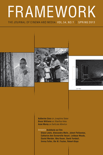
Framework-The Journal of Cinema and Media
Advancing scholarship in film and media theory.Framework: The Journal of Cinema and Media is a prominent academic journal published by Wayne State University Press, focusing on the dynamic fields of cinema studies and media theory. With an ISSN of 0306-7661 and an E-ISSN of 1559-7989, it serves as a key platform for researchers, professionals, and students to explore critical issues in media culture, film theory, and the intersection of digital technologies and narrative. Although it does not currently offer open access, the journal maintains a reputation for rigorous scholarship and thought-provoking content, providing insights that challenge conventional understandings of media and its impact on society. Published in Detroit, MI, Framework continues to engage with contemporary debates and innovative practices in cinema and media, making it an essential resource for those dedicated to advancing research in these vibrant disciplines.
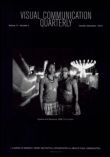
Visual Communication Quarterly
Charting New Territories in Visual Communication ResearchVisual Communication Quarterly, published by Routledge Journals, Taylor & Francis Ltd, is a leading academic journal dedicated to the study and exploration of visual communication in various contexts. Established in 1994, this journal has established itself as a significant source of knowledge within the fields of communication and education, as evidenced by its ranking in the Q2 and Q3 quartiles respectively in 2023. Although it does not currently offer open access, it continues to present cutting-edge research which reflects contemporary visual communication practices and theories. With an ISSN of 1555-1393 and E-ISSN 1555-1407, Visual Communication Quarterly serves as an essential platform for academics, professionals, and students who seek to advance their understanding of how visual media shape public discourse, identity, and educational practices. With a convergence of scholarship anticipated until 2024, this journal promises to remain relevant and influential in the ever-evolving landscape of visual communication.
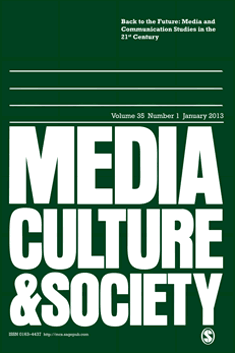
MEDIA CULTURE & SOCIETY
Advancing Scholarly Insights into Society's Media LandscapeMEDIA CULTURE & SOCIETY, published by SAGE PUBLICATIONS LTD, is a prominent academic journal dedicated to the interdisciplinary exploration of media, culture, and societal dynamics. With a long-standing history since its inception in 1979 and extending to 2024, this journal serves as a vital platform for researchers, professionals, and students interested in understanding the complex interplay between media and cultural phenomena. Operating from the United Kingdom, it holds a prestigious Q1 ranking in both communication and sociology/political science categories, reflecting its significant impact within these fields. The journal’s Scopus ranks further attest to its excellence, placing it in the top percentiles and making it an essential resource for advancing scholarly discussions. While not open access, MEDIA CULTURE & SOCIETY continues to provide insightful analyses that shape contemporary discourse on the role of media in society, ensuring its relevance and importance to academic communities worldwide.

Intersections-Gender and Sexuality in Asia and the Pacific
Fostering Interdisciplinary Insights into Gender DynamicsIntersections: Gender and Sexuality in Asia and the Pacific is a pioneering scholarly journal published by the Australian National University, focusing on critical discourse surrounding gender and sexuality within the diverse cultural contexts of Asia and the Pacific. With its ISSN of 1440-9151, the journal invites researchers, professionals, and students to explore the intersections of identity, culture, and societal norms that shape experiences in this vibrant region. While the journal currently maintains an open access status, its contributions are pivotal in shedding light on underrepresented voices and narratives. With a commendable ranking within Q4 in the categories of Cultural Studies, Gender Studies, and History for 2023, it serves as a crucial platform for academics seeking to engage with interdisciplinary perspectives. Over its years of publication, from 2018 to 2023, Intersections has solidified its importance in advancing knowledge and fostering dialogue crucial for understanding the complexities of gender and sexuality in contemporary society. It continues to challenge conventional boundaries and aims to provide meaningful insights that resonate across cultures and disciplines.
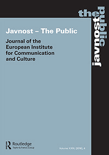
JAVNOST-THE PUBLIC
Fostering Dialogue for Contemporary ChallengesJAVNOST - THE PUBLIC is a prestigious academic journal that has established itself as a leading platform within the field of communication. Published by Routledge Journals, Taylor & Francis Ltd in the United Kingdom, this journal caters to researchers, professionals, and students interested in the multifaceted dynamics of public communication and societal engagement. With an impressive Q1 ranking in the Communication category as of 2023 and a Scopus ranking of #166/511, placing it in the 67th percentile, it is widely recognized for its rigorous research contributions and theoretical insights. The journal has been in continuous circulation since its inception in 1994, and it actively seeks to publish high-quality, empirical studies that explore the nuances of public discourse, media influence, and societal interactions. Though a traditional publication, JAVNOST - THE PUBLIC remains committed to advancing the field by offering valuable resources and knowledge crucial for addressing contemporary challenges in public communication.
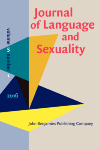
Journal of Language and Sexuality
Pioneering Interdisciplinary Research on Language and SexualityJournal of Language and Sexuality, published by John Benjamins Publishing Co, stands at the forefront of interdisciplinary research in the fields of Anthropology, Gender Studies, and Linguistics. With an ISSN of 2211-3770 and an E-ISSN of 2211-3789, this esteemed journal has quickly gained prominence, achieving a prestigious Q1 ranking in its categories as of 2023. Covering diverse topics that intersect language with sexual identity and expression, it serves as a critical platform for scholars and practitioners alike, fostering dialogue and exploration of contemporary issues surrounding language use in the context of sexuality. Despite not offering open access, the journal is indexed in Scopus, underscoring its relevance and rigorous academic standards, making it an essential resource for anyone involved in the research of language and societal constructs from 2019 through to 2024. Positioned in the Netherlands, the journal continues to cultivate a global audience keen on advancing knowledge in this vibrant area of study.

Genre Sexualite & Societe
Illuminating the Complexities of Gender and SocietyGenre Sexualite & Societe is a renowned open-access journal published by ECOLE HAUTES ETUDES & SCIENCES SOC-EHESS, COLL FRANCE, focusing on the complex dynamics of gender, sexuality, and society. Since its inception in 2009, this journal has established itself as a vital resource for interdisciplinary research, fostering scholarly discussion among researchers, professionals, and students in the fields of sociology, gender studies, and sexualities. With an ISSN of 2104-3736 and a commitment to providing freely accessible content, Genre Sexualite & Societe aims to bridge gaps in knowledge and promote diverse perspectives on contemporary social issues. Based in Paris, France, the journal encourages the submission of innovative research which explores the intersections of identity, power structures, and social practices, underscoring its significance in the academic community.